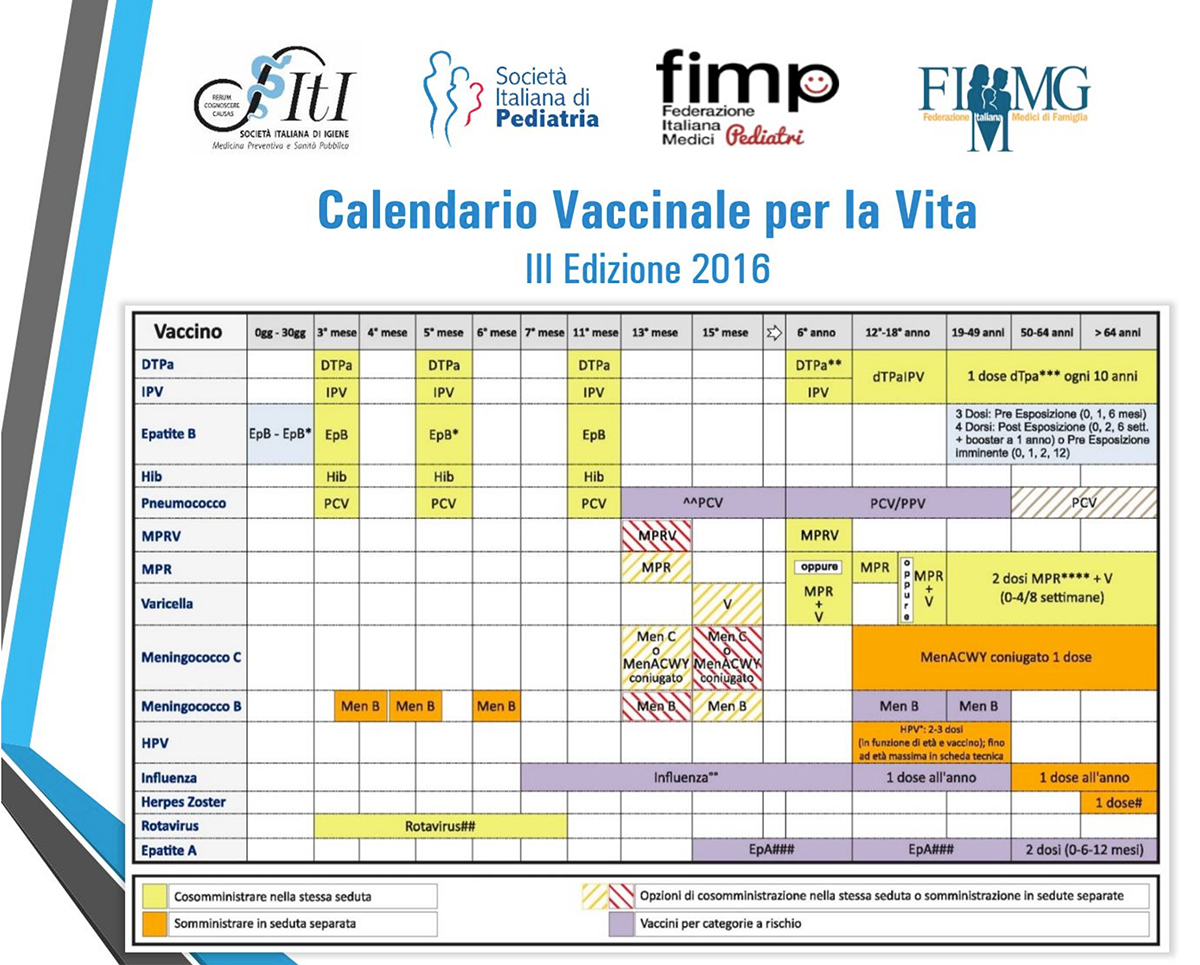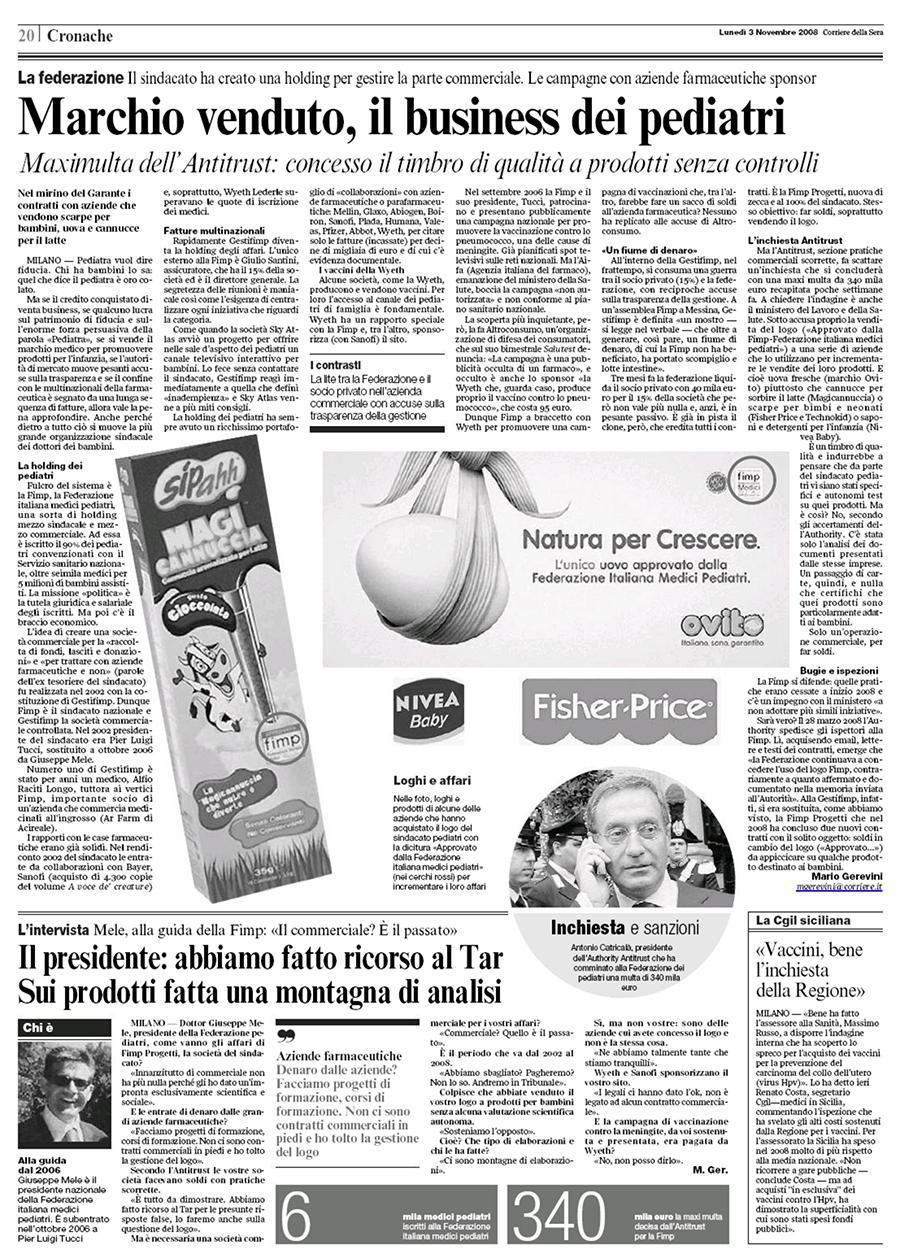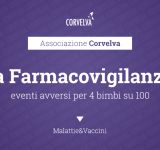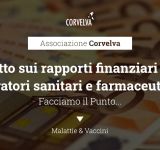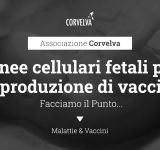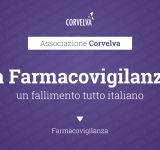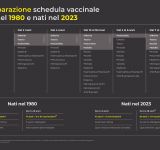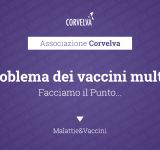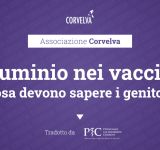All about the financial relationships between healthcare professionals and pharmaceutical companies
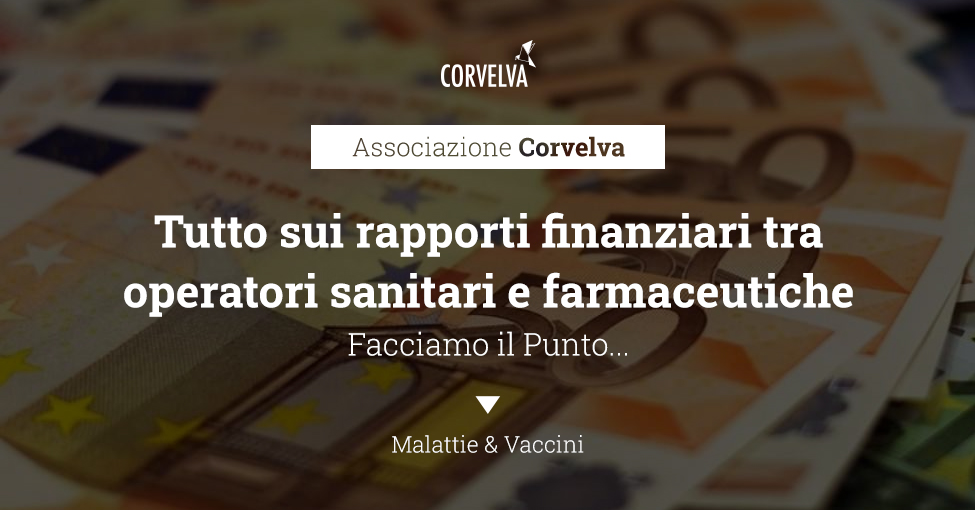
Relationships between healthcare professionals and pharmaceutical industries have a crucial impact on our lives. Conflicts of interest, gifts and means of promotion can influence the behavior of healthcare professionals, patients and citizens with effects that are difficult to determine.
For us the topic is a priority, enough to have pushed us to annually collect and archive the only certain and quantifiable data on the exchange of money between the pharmaceutical industries and the Italian scientific/health sector and to do so we have relied on the Code EFPIA(1) on Transparency, a self-regulation code that requires pharmaceutical companies associated with the European Federation of Pharmaceutical Industries and Association (EFPIA) to make these economic transfers public.
The data is not exactly easy to find, it is "hidden" on the website of the individual industry and is often made up of very large files, with tens or hundreds of pages of data. The most sadistic industries upload it into images, also taking away the possibility of searching, through technical tools, of the individual scientific society, the name of a doctor or a university.
All this loving passion for transparency means that rarely does anyone sit down and sift through these documents, study them and archive them, making them accessible to everyone in a simplified form... well, we are among those rare people who have been doing it since 2015, especially given that the EFPIA Code requires the publication of the last 3 years and not the entire history and perhaps you will not be surprised to know that all the industries diligently delete every previous report.
We understand the phenomenon
Dr. McCartney explains the context of "conflict of interest" better in a 2018 article published in BMJ:(2)
“Let's play a game: try to find a doctor's conflicts of interest. Set the timer and get online. Yesterday I spent four hours trying to locate statements made by members of a committee that wrote guidelines three years ago. Statements were not available in the guidelines. They were in the minutes of the committee meetings… Alternatively, try searching for GP group gift registers. Many are difficult to locate, are not alphabetical and cover limited periods. And suppose the doctor in question is not on one of these groups or on a guidelines committee? Where to look?... The British Pharmaceutical Industry Association voluntarily publishes payments to doctors. But at least half of those payments, around £53m (€60,1m), are unreported. And drug company payments aren't the only conflict a doctor may have. If a doctor runs a practice that promotes specific products and receives money from the company that supplies them or acts as a consultant to that company, patients have a right to know.”
From the systematic review of 26 studies published between 2003 and 2018, published in the British Medical Journal,(3) it emerges that just under a third of the associations that have received funds from the industry declare this on their websites (also in Italy). Furthermore, there are few associations that have a code of conduct on sponsorships.
Another article from 2023(4) showed how payments from the pharmaceutical industry to the Royal Colleges (the name of many British professional associations) between 2015 and 2022 reached more than £9 million and once the author asked individual associations to disclose details on the sums received, practically all of them refused to respond given that the law does not oblige them to be transparent on financial matters.
Recently a major pharmaceutical company, Novo Nordisk, was suspended by the Association of the British Pharmaceutical Industries (ABPI) after The Guardian(5) found that experts who had given a positive opinion to the National Institute for Health and Care Excellence (NICE is a non-departmental body under the Department of Health in the United Kingdom) on a new weight-loss drug had received payments from the same manufacturer, the Novo Nordisk. Between 2019 and 2021, the firm had made over 3.500 payments, totaling £21,7m, to obesity charities, NHS trusts, Royal Colleges for event sponsorship , to GP surgeries and universities, as well as to NICE consultants. Novo Nordisk had also helped fund a group of parliamentarians lobbying for obesity intervention strategies.
Everything is openly in order, in accordance with the law, under the light of day and the recipients of the financing may not even have been influenced by the river of money arriving in their current accounts, but the doubt remains.
And in Italy?
The Italian situation is relatively simple and with quite complicated nuances. Perhaps numbers can say more than many words: the main 14 pharmaceutical industries operating in Italy, from 2015 to 2022, have given 1,1 billion euros to healthcare workers, universities, scientific societies, trade associations, federations and event companies .
€ 1.135.691.540
Table 1 - Total value transfers of the 14 main pharmaceutical industries operating in Italy. Analyzed period 2016-2022
| Pharmaceutical industry | 2015-2022 |
| AbbVie | € 25.353.661 |
| Angelini | € 42.201.580 |
| AstraZeneca | € 101.172.360 |
| Bayer | € 88.286.587 |
| Dompe | € 18.514.673 |
| Gilead Sciences | € 65.299.807 |
| GlaxoSmithKline | € 155.814.660 |
| Lilly | € 31.002.878 |
| Merck | € 18.158.375 |
| MSD | € 115.753.217 |
| Novartis | € 123.459.197 |
| Pfizer(6) | € 75.862.931 |
| Roche | € 222.292.060 |
| Sanofi | € 52.519.555 |
| Total | € 1.135.687.623 |
Click here to see the table divided by year
Table 1.1 - Total value transfers of the 14 main pharmaceutical industries operating in Italy divided year by year. Analyzed period 2016-2022
| Pharmaceutical industry | 2016 | 2017 | 2018 | 2019 | 2020 | 2021 | 2022 |
| AbbVie | € 3.096.922 | € 3.752.205 | € 5.045.241 | € 4.213.230 | € 4.941.804 | € 4.304.259 | - |
| Angelini | € 7.180.544 | € 10.283.046 | € 9.041.308 | € 6.404.962 | € 5.131.093 | € 3.890.708 | € 269.919 |
| AstraZeneca | € 12.473.701 | € 13.430.940 | € 12.050.625 | € 13.699.760 | € 13.699.760 | € 14.844.091 | € 20.973.483 |
| Bayer | € 6.145.541 | € 27.007.656 | € 24.353.000 | € 22.811.496 | € 6.547.834 | € 541.638 | € 879.422 |
| Dompe | € 678.418 | € 1.474.970 | € 3.321.944 | € 2.384.240 | € 2.490.754 | € 3.172.309 | € 4.992.038 |
| Gilead Sciences | € 7.648.323 | € 14.492.634 | € 13.544.025 | € 13.460.136 | € 12.293.383 | € 2.521.656 | € 1.339.650 |
| GlaxoSmithKline | € 13.496.539 | € 14.756.250 | € 21.914.245 | € 19.359.716 | € 25.410.410 | € 29.470.899 | € 31.406.601 |
| Lilly | € 3.068.888 | € 4.369.621 | € 4.592.177 | € 4.165.367 | € 5.278.465 | € 5.421.442 | € 4.106.918 |
| Merck | € 2.611.848 | € 2.769.537 | € 2.943.021 | € 2.630.256 | € 3.609.797 | € 2.003.568 | € 1.590.348 |
| MSD | € 12.103.650 | € 9.962.106 | € 9.883.673 | € 12.162.437 | € 15.126.463 | € 20.672.938 | € 35.841.949 |
| Novartis | € 20.182.962 | € 16.909.280 | € 19.475.713 | € 20.296.829 | € 17.712.609 | € 15.218.676 | € 13.663.128 |
| Pfizer | € 16.146.695 | € 6.566.870 | € 10.508.532 | € 10.238.537 | € 10.242.454 | € 10.319.009 | € 11.840.834 |
| Roche | € 29.990.912 | € 22.983.989 | € 32.979.850 | € 38.192.992 | € 31.897.064 | € 30.348.441 | € 35.898.812 |
| Sanofi | € 4.614.051 | € 3.950.987 | € 4.965.282 | € 6.110.137 | € 5.658.714 | € 5.480.591 | € 21.739.793 |
| Total | € 139.438.994 | € 152.710.091 | € 174.618.636 | € 176.130.094 | € 160.040.604 | € 148.210.225 | € 184.542.895 |
The vaccine sector is very interesting. The seven companies that produce vaccines, Merck, MSD, GlaxoSmithKline, Novartis, Sanofi, AstraZeneca and Pfizer have given out 36% of the total. We are talking about over 642 million euros between 2016 and 2022 with a constant increase over time. Money pouring in on doctors, healthcare workers in general, scientific companies operating directly and indirectly in the vaccine sector, universities and intermediary companies capable of pressuring the legislator so that a "scientific" direction becomes law? The doubt comes to us, even though we remind ourselves, as we have said, that everything is legitimate and - almost - in the open.
Allow us to reflect and we will ask it to you in the form of a question: suppose that Corvelva receives 100 thousand euros each from a company that produces a drug, let's pretend that it is a homeopathic drug that is more up our alley, and in the meantime we launch a campaign insistent disparagement towards some allopathic drugs. Let's pretend that everything is out in the open, written in black and white but with a microscopic character inserted on page 150 of a PDF that no one will ever read because it is hidden in a subpage of the website of the manufacturer of that homeopathic drug. In your opinion, would it be a conflict of interest or love for our supporters who are recommended a drug even if we take money from the manufacturer of this drug?
And again, if Corvelva was so powerful as to be listened to by the legislator and the push towards this drug led to a law that imposes it by force, under blackmail, what would you think?
Let's now take something real, remembering that ours is only a purely dialectical exercise and there is no accusation of corruption against anyone: the Vaccination Calendar for Life.(7)
It is necessary to take a step back to contextualize the period. In 2014, Minister Lorenzin, Sergio Pecorelli (at the time President of AIFA who later resigned due to alleged conflicts of interest) and Ranieri Guerra (at the time Scientific Advisor to the Embassy in Washington) flew to the White House to meet the President of the United States of America Barack Obama and returned with Italy designated as “leader for global vaccination strategies”.(8) From this moment on there was a powerful vaccine-centric push in Italy which also led to this vaccination calendar.
In this socio-political climate, some of the main Scientific Societies and National Federations that deal with vaccination among their most relevant topics have presented a vaccination calendar called Vaccination Calendar for Life. Let's talk about ITIS (Italian Society of Hygiene, Preventive Medicine and Public Health), the SIP (Italian Society of Paediatrics),(9) la FIMP (Italian Federation of Pediatricians)(10) , FIMMG (Italian Federation of General Practitioners),(11) with attached METIS (Scientific Society of General Practitioners) of which FIMMG is the sole member.(12)
In that socio-political context they also contributed to creating the scientocratic humus SIMG (Italian Society of General Medicine and Primary Care),(13) la SIMIT (Italian Society of Infectious and Tropical Diseases)(14) and of course all blessed by'Higher Institute of Health. These 8 Italian companies have received over 13 million euros in 7 years!
€ 13.530.783
Table 2 - Transfers of value between the main pharmaceutical industries producing vaccines and the main scientific companies dealing with vaccines. Analyzed period 2015-2022
| Pharmaceutical industry | 2015-2022 |
| SIP - Italian Society of Paediatrics | € 681.458 |
| FIMP - Italian Federation of Pediatricians | € 2.249.931 |
| FIMMG – Italian Federation of General Practitioners | € 980.073 |
| METIS - Scientific Society of General Practitioners | € 2.245.079 |
| SITI - Italian Hygiene Society | € 401.185 |
| SIMG - Italian Society of General Medicine and Primary Care(15) | € 3.089.691 |
| SIMIT - Italian Society of Infectious and Tropical Diseases(16) | € 3.158.561 |
| ISS - Higher Institute of Health | € 673.594 |
| Total | € 13.530.783 |
There is no doubt that the role of these realities has been decisive in national policies, especially regarding the approval of Law 119 of 31 July 2017 which introduced the mandatory vaccination for 10 vaccinations for the age group 0-16 years.
Let's now look at the tables in detail.
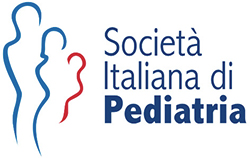
The SIP (Italian Society of Paediatrics) is a scientific association that promotes research, training and scientific information in the pediatric field and provides training activities in healthcare. We have collected data relating only to SIP and not to all 19 affiliated companies,(17) to the individual doctors and managers who compose it, but we are certain that interesting data would emerge from it. There is no doubt about the relationship between SIP and the multinational pharmaceutical companies and it is not even something that is too hidden, just look at the national conferences that they hold annually and which have GSK and MSD among their permanent sponsors.(18)
Among the various permanent technical tables of the SIP we have the one called "Vaccinations and Infectious Diseases" with Susanna Esposito(19) as coordinator for infectious diseases. Dr. Susanna Esposito received some transfers of value between 2020 and 2022 (let's take only the last three years) from various industries directly interested in her area of expertise. We repeat it and we will repeat it until the end, everything is legal, it would also be nice if it was always placed in overlay when Esposito makes a statement about vaccines that she perceived as over 54 thousand euros by those who produce vaccines. Not much money, but it would only be a sign of transparency to declare it.
Let's go back again to the numbers in general at SIP:
Table 3 - Transfers of value between the main pharmaceutical vaccine producing industries and SIP. Analyzed period 2015-2022
| Pharmaceutical industry | 2015-2022 |
| GSK |
€ 342.524 |
| Novartis |
€ 6.100 |
| Pfizer |
€ 104.850 |
| Sanofi |
€ 227.984 |
| Total | € 681.458 |
Click here to see the table broken down for each year
Table 3.3 - Transfers of value between the main pharmaceutical vaccine producing industries and the SIP divided year by year. Analyzed period 2015-2022
| Pharmaceutical industry | 2015 | 2016 | 2017 | 2018 | 2019 | 2020 | 2021 | 2022 |
| GSK | € 27.450 | € 26.840 | € 55.729 | € 78.175 | € 95.770 | € 12.200 | € 10.980 | € 35.380 |
| Novartis | - | - | - | - | - | - | - | € 6.100 |
| Pfizer | € 10.000 | € 1.500 | € 31.000 | € 42.350 | - | - | - | € 20.000 |
| Sanofi | - | € 27.084 | € 1.525 | - | € 76.921 | € 34.367 | - | € 88.087 |
| Total | € 681.458 |
![]()
The FIMP (Italian Federation of Pediatric Doctors) is the oldest and most representative Italian union of family paediatricians. In addition to its strictly trade union activity and its contribution together with the institutions to the development of pediatric primary care, it has always carried out assiduous training activities aimed to its members.
We tried to compare the total FIMP membership fees with the transfers of value from the pharmaceutical industries to try to get a more complete picture but we realized that FIMP does not publish financial statements. Nothing illicit, just not very transparent and by delving deeper into the topic we came across a particularly thorny past. In 2008, FIMP was at the center of investigations, resulting in a huge Antitrust fine, for having granted the quality stamp to some products intended for children without ever having carried out any checks on these products;(20) the investigation was called “Brand sold, the pediatrician business”. Relations with pharmaceutical companies and FIMP were already solid well before the investigation given that in the union's 2002 report, revenues from collaborations with Bayer, Sanofi and Wyeth Lederle (it was later purchased in 2016 by Pfizer) exceeded membership fees of pediatricians.
Well, in short, but let's go back to the general numbers:
Table 4 - Transfers of value between the main pharmaceutical vaccine producing industries and FIMP. Analyzed period 2015-2022
| Pharmaceutical industry | 2015-2022 |
| GSK | € 1.105.359 |
| Merck | € 12.000 |
| MSD | € 22.000 |
| Pfizer | € 651.206 |
| Sanofi | € 461.542 |
| Total | € 2.252.107 |
Click here to see the table broken down for each year
Table 4.1 - Transfers of value between the main pharmaceutical vaccine producing industries and FIMP divided by year. Analyzed period 2015-2022
| Pharmaceutical industry | 2015 | 2016 | 2017 | 2018 | 2019 | 2020 | 2021 | 2022 |
| GSK | € 56.120 | € 153.692 | € 149.323 | € 191.849 | € 145.370 | € 133.591 | € 154.803 | € 120.612 |
| Merck | - | - | € 12.000 | - | - | - | - | - |
| MSD | - | - | € 10.000 | € 12.000 | - | - | - | - |
| Pfizer | € 90.650 | € 51.875 | € 52.125 | € 75.980 | - | € 130.476 | € 128.300 | € 121.800 |
| Sanofi | - | € 2.440 | - | € 21.655 | € 116.632 | € 111.223 | € 104.310 | € 105.282 |
| Total | € 2.252.107 |

The Italian Federation of General Practitioners, FIMMG, is the national trade union association which aims to represent the professional, legal, economic, social security and welfare interests of affiliated doctors operating at a local level and to maintain relations with the NHS. Since FIMMG is the sole member of METIS (Scientific Society of General Practitioners), we treat them together.
Let's look at some numbers:
Table 5 - Transfers of value between the main pharmaceutical vaccine producing industries and the FIMMG and METIS. Analyzed period 2015-2022
| Pharmaceutical industry | FIMMG (2015-2022) | METIS (2015-2022) |
| GSK | € 12.000 | € 655.630 |
| Merck | € 12.200 | - |
| MSD | € 750.000 | € 89.488 |
| Novartis | - | € 729.181 |
| Pfizer |
€ 158.350 | € 578.395 |
| Sanofi |
€ 47.523 | € 241.418 |
| Total | € 980.073 | € 2.294.112 |
Click here to see the table broken down for each year
Table 5.1 - Transfers of value between the main pharmaceutical vaccine producing industries and FIMMG divided by year. Analyzed period 2015-2022
| Pharmaceutical industry | 2015 | 2016 | 2017 | 2018 | 2019 | 2020 | 2021 | 2022 |
| Astrazeneca | € 12.000 | - | - | - | - | - | - | - |
| GSK | - | - | - | - | - | € 12.200 | - | - |
| MSD | € 750.000 | - | - | - | - | - | - | - |
| Pfizer | € 8.350 | € 150.000 | - | - | - | - | - | - |
| Sanofi | - | - | - | - | € 43.131 | - | - | € 4.392 |
| Total | € 2.252.107 |
Table 5.2 - Transfers of value between the main pharmaceutical vaccine producing industries and METIS divided by year. Analyzed period 2015-2022
| Pharmaceutical industry | 2015 | 2016 | 2017 | 2018 | 2019 | 2020 | 2021 | 2022 |
| GSK | - | € 58.926 | € 184.376 | € 46.771 | € 92.994 | € 144.198 | € 128.365 | - |
| MSD | - | € 1.700 | - | € 17.500 | € 40.964 | € 8.500 | € 7.504 | € 13.320 |
| Novartis | - | € 127.085 | € 91.080 | € 90.000 | € 40.000 | € 122.021 | € 167.031 | € 91.964 |
| Pfizer | - | € 127.172 | € 83.660 | € 10.000 | - | € 86.977 | € 216.776 | € 53.810 |
| Sanofi | - | - | - | € 78.620 | € 61.236 | € 42.373 | € 27.328 | € 31.861 |
| Total | € 980.073 |
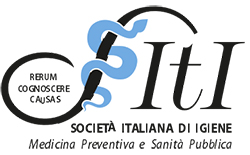
SIMIT (Italian Society of Infectious and Tropical Diseases) deals with scientific and research activities. Their opinion is inevitable whenever we talk about vaccines and vaccination.
Let's see their numbers:
Table 6 - Transfers of value between the main pharmaceutical vaccine producing industries and SIMIT. Analyzed period 2015-2022
| Pharmaceutical industry | 2015-2022 |
| MSD | € 48.000 |
| SANOFI | € 353.185 |
| Total | € 401.185 |
Click here to see the table broken down for each year
Table 6.1 - Transfers of value between the main pharmaceutical vaccine producing industries and SITI divided by year. Analyzed period 2015-2022
| Pharmaceutical industry | 2015 | 2016 | 2017 | 2018 | 2019 | 2020 | 2021 | 2022 |
| MSD | - | - | € 48.000 | - | - | - | - | - |
| Sanofi | - | € 112.814 | - | - | € 17.690 | € 43.097 | € 66.770 | € 112.814 |
| Total | € 401.185 |
![]()
The SIMG (Italian Society of General Medicine and Primary Care) is an autonomous and independent association created to promote, enhance and support the professional role of general practitioners, both in Italian healthcare and in European and non-European healthcare organisations. He is a member of the Federation of Scientific Societies (F.I.S.M.).
SIMG has an EFPIA section(21) and this makes it extremely clearer than all other realities. Let's see her numbers:
Table 7 - Transfers of value between the main pharmaceutical vaccine producing industries and SIMG. Analyzed period 2015-2022
| Pharmaceutical industry | 2015-2022 |
| Astrazeneca | € 897.748 |
| GSK | € 1.014.934 |
| Merck | € 38.000 |
| MSD | € 53.200 |
| Novartis | € 524.561 |
| Pfizer | € 255.550 |
| Sanofi | € 341.649 |
| Total | € 3.125.642 |
Click here to see the table broken down for each year
Table 7.1 - Transfers of value between the main pharmaceutical vaccine producing industries and SIMG divided by year. Analyzed period 2015-2022
| Pharmaceutical industry | 2015 | 2016 | 2017 | 2018 | 2019 | 2020 | 2021 | 2022 |
| Astrazeneca | - | - | - | € 185.000 | € 185.000 | - | - | - |
| GSK | € 15.860 | € 8.662 | € 7.320 | € 48.556 | € 199.836 | € 452.550 | € 182.110 | € 100.040 |
| MSD | - | - | - | - | - | € 53.200 | - | - |
| Pfizer | € 30.000 | € 44.000 | € 56.000 | € 31.050 | - | € 12.500 | € 41.500 | - |
| Sanofi | - | € 7.930 | € 3.360 | € 35.233 | € 25.620 | € 89.160 | € 65.980 | € 23.790 |
| Total | € 1.904.257 |
Table 7.2 - Transfers of value between the main pharmaceutical vaccine producing industries and SIMG Service Srl divided by year. Analyzed period 2015-2022
| Pharmaceutical industry | 2015 | 2016 | 2017 | 2018 | 2019 | 2020 | 2021 | 2022 |
| Astrazeneca | - | - | - | - | € 129.510 | € 129.510 | € 126.308 | € 142.420 |
| Merck | - | - | - | - | - | - | - | € 38.000 |
| Novartis | - | - | - | € 80.000 | € 88.440 | € 146.850 | € 189.271 | € 20.000 |
| Pfizer | - | - | - | € 4.550 | - | - | - | - |
| Sanofi | - | - | - | - | € 1.416 | € 89.160 | - | - |
| Total | € 1.185.435 |
![]()
SIMIT (Italian Society of Infectious and Tropical Diseases) deals with scientific and research activities. Their opinion is inevitable whenever we talk about vaccines and vaccination.
Let's see their numbers:
Table 8 - Transfers of value between the main pharmaceutical vaccine producing industries and SIMG. Analyzed period 2015-2022
| Pharmaceutical industry | 2015-2022 |
| GSK | € 1.731.562 |
| MSD | € 1.427.000 |
| Total | € 3.158.562 |
Click here to see the table broken down for each year
Table 8.1 - Transfers of value between the main pharmaceutical vaccine producing industries and SIMIT divided by year. Analyzed period 2015-2022
| Pharmaceutical industry | 2015 | 2016 | 2017 | 2018 | 2019 | 2020 | 2021 | 2022 |
| GSK | 0 | € 225.436 | € 296.204 | € 368.468 | € 314.996 | € 46.863 | € 29.560 | € 297.535 |
| MSD | € 660.000 | - | € 675.000 | - | € 92.000 | - | - | - |
| Total | € 3.006.062 |
Table 8.2 - Transfers of value between the main pharmaceutical vaccine producing industries and SIMIT Servizi Srl divided by year. Analyzed period 2015-2022
| Pharmaceutical industry | 2015 | 2016 | 2017 | 2018 | 2019 | 2020 | 2021 | 2022 |
| GSK | 0 | 0 | € 24.400 | 0 | € 36.600 | - | - | € 91.500 |
| Total | € 152.500 |
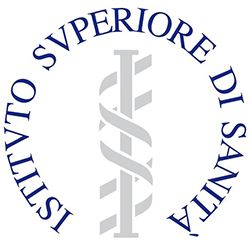
A book could be written about the Istituto Superiore di Sanità, perhaps even two, but let's start first with the numbers that clarify many things: from 2015 to 2022 it received over 673 thousand euros from direct vaccine producers and this raises the question of independence.
Table 9 - Transfers of value between the main pharmaceutical vaccine producing industries and the ISS. Analyzed period 2016-2022
| Pharmaceutical industry | 2016-2022 |
| GSK | € 332.594 |
| MSD | € 316.000 |
| Novartis | € 25.000 |
| Total | € 673.594 |
Click here to see the table broken down for each year
Table 9.1 - Transfers of value between the main pharmaceutical vaccine producing industries and the ISS divided by year. Analyzed period 2016-2022
| Pharmaceutical industry | 2015 | 2016 | 2017 | 2018 | 2019 | 2020 | 2021 | 2022 |
| GSK | - | € 125.660 | € 93.940 | € 112.994 | - | - | - | - |
| MSD | - | € 150.000 | € 100.000 | - | € 33.000 | € 33.000 | - | - |
| Novartis | - | € 25.000 | - | - | - | - | - | - |
| Total | € 673.594 |
In addition to these 673 thousand euros, we have an interesting piece of data to show you. An episode of 9 December 2018 of Le Iene(22) showed how Walter Ricciardi, President of the Istituto Superiore di Sanità since 2015, has had numerous collaborations with pharmaceutical companies, even collaborations for the magazines of a lobbying company in the pharmaceutical sector. Ricciardi also acted as a consultant for pharmaceutical companies for various products including GSK's MenB, included among the mandatory vaccines proposed in the first draft of the Lorenzin Decree and pushed, as mandatory, by Ricciardi himself
EFPIA reports (in alphabetical order)
If you want to search for the name of your doctor, your university or the scientific society that made a statement that was particularly unpleasant to you, you can download all the EFPIAs from 2015 to 2022.
- AbbVie
- Amfgen
- Angelini
- AstraZeneca
- Bayer
- Dompe
- Celgene
- Gilead Sciences
- GlaxoSmithKline
- LeoFarma
- Lilly
- Merck
- MSD
- Novartis
- Pfizer
- Sanofi
- Teva
References
- https://www.efpia.eu/relationships-code/the-efpia-code/
- BMJ 2018; 360 doi: https://doi.org/10.1136/bmj.k135 (Published 22 January 2018)
- https://www.bmj.com/content/bmj/368/bmj.l6925.full.pdf
- Boytchev H. Medical royal colleges receive millions from drug and medical devices companies. BMJ 2023;382:p1658
- https://www.theguardian.com/business/2023/mar/12/revealed-experts-who-praised-new-skinny-jab-received-payments-from-drug-maker
- We added Pfizer S.r.l, Pfizer Italia S.r.l and Pfizer Established Medicine Italy s.r.l.
- https://www.vaccinarsi.org/notizie/2019/07/%E2%80%8Bcalendario-vaccinale-per-la-vita-2019
- https://www.aifa.gov.it/-/l-italia-capofila-per-le-strategie-vaccinali-a-livello-mondiale
- https://sip.it/
- https://www.fimp.pro/
- https://fimmg.org/
- https://www.fadmetis.it
- https://www.simg.it/
- https://simit.org/
- For the calculation of SIMG value transfers we also included SIMG Service Srl
- For the calculation of SIMIT's transfers of value we also included SIMIT Servizi Srl
- https://sip.it/societa-affiliate/
- https://sip2023.it/
- https://www.susannaesposito.it/curriculum-biografia/
- https://www.corvelva.it/approfondimenti/sistema-sanita/la-scienza/marchio-venduto-il-business-dei-pediatri-fimp.html
- https://www.simg.it/efpia/
- https://www.iene.mediaset.it/video/walter-ricciardi-istituto-superiore-sanita-conflitto-interessi-roberta-rei_263789.shtml

